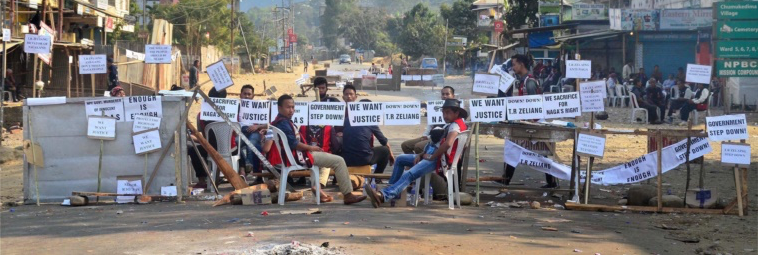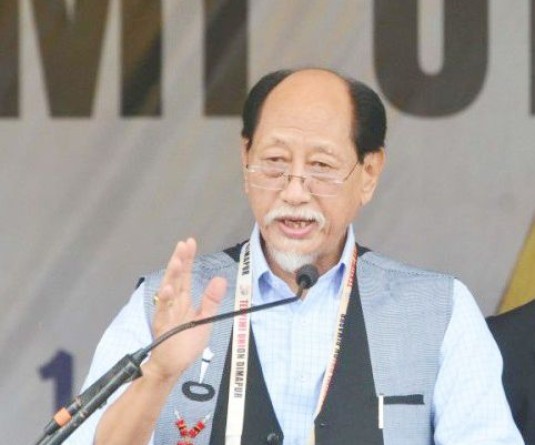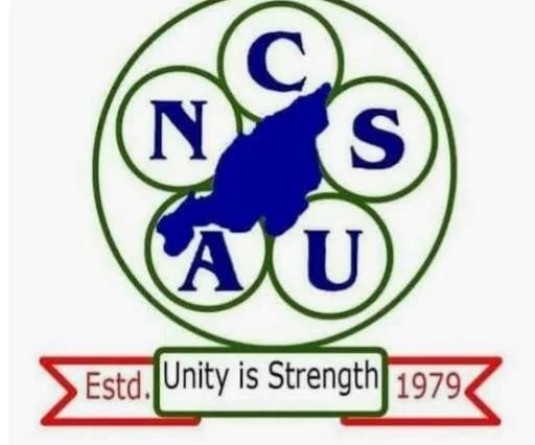Bandh supporters block the highway during a strike call given by Joint Coordination Committee against 33% women's reservation and killing of two person in police firing in Dimapur. (PTI File Photo)

Morung Express News
Kohima | February 23
The Supreme Court of India, on February 22, took the Government of Nagaland to task over what it termed as a ‘lackadaisical attitude’ towards implementing 33 % women reservation in the Urban Local Bodies (ULBs) in the state. “An important aspect of gender equality seems to be getting postponed and a decade has passed in that behalf,” the apex court stated in its order.
Upon perusal of the synopsis filed by respondent, the Nagaland State Election Commission, the court order stated “the report is once again reflection on the lackadaisical attitude of the State Government even in furtherance of assurances given to this Court apart from the fact of the legal mandate which they are required to follow.”
The order further stated that the state government is not responding to the request of the Election Commission for conduct of summary revision of E-rolls for three Municipal Councils, 29 Town Councils and fresh E-rolls for the newly created Town Councils in the State.
“It is pointed out that the last summary revision was done in the year 2016 after which no summary revision has taken place till date leading to a huge gap in the old available data in the office as opposed to the present day figures have not been updated for five years. Apart from this, 7 new Town Councils were created vide Government Notification dated 13.11.2019,” the order stated.
To this effect, the Court has granted six weeks’ time for the said purpose further stating “we make it clear that a date has to be pointed out to us on the next date for completing the exercise.”
The Court also directed the state to respond to the state Election Commission within two weeks and said, “Any non-compliance by the state will be treated as a violation of this court’s order.”
The next hearing has been scheduled for April 12.
Speaking to The Morung Express, Nagaland Chief Secretary J Alam said that a committee constituted by the government and headed by him has submitted its report, and that the government is yet to take a decision on this matter.
On the contents of the report, he said “I cannot discuss the contents of the report, but then we are yet to have a full consensus on this.”
Responding on whether the government is obligated to take decisions on the matter based on the opinions of the tribal hohos, he said “that is not the issue, but we need to conduct free, fair and peaceful polls and so it’s important that we get the support all various sections of the society.”
Meanwhile, Advisor to the Naga Mothers’ Association Prof Rosemary Dzüvichü firmly asserted that sooner or later, the government has to implement reservation for women.
“It is a law. This is not something special that Naga women are asking for, and that is something our people are not understanding” she observed and added that “There is no negotiation. There is no going around.”
However, she was hopeful that in the coming days, the state of Nagaland should be able to have the elections.
It may be mentioned that 33% women reservation in the state Urban Local Bodies election has been a contentious issue in Nagaland and ULBs election have not been conducted for almost a decade in the state.
The state witnessed violent protests in 2017 which claimed two lives, following the decision of the state government to hold ULB election. Subsequently, the entire process of elections to ULBs in the state stands null and void till today.
Local tribal bodies have come out strongly opposing the 33% reservation seat for women in the ULB elections tooth and nail, on the grounds that it infringes Article 371 (A) of the Constitution, a special provision granted to the state of Nagaland.
While leaders have been stressing on the necessity of holding ULB election for development in urban areas, the latest government’s notification on November 18, 2021, proposing the constitution of an Advisory Council to various Municipal and Town Councils with 33% nominated members for women for an interim period was met with stiff opposition from various organisations.






